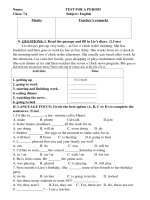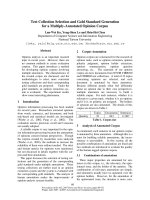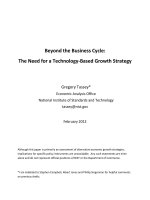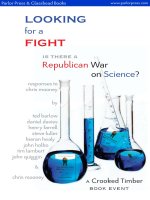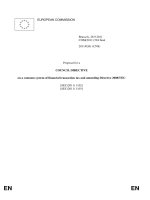LOOKING for a FIGHT IS THERE A Republican War on Science? potx
Bạn đang xem bản rút gọn của tài liệu. Xem và tải ngay bản đầy đủ của tài liệu tại đây (785.87 KB, 100 trang )
IS THERE A
Republican War
on Science?
L OOKING
for a
FIGHT
responses to
chris mooney
by
ted barlow
daniel davies
henry farrell
steve fuller
kieran healy
john holbo
tim lambert
john quiggin
&
chris mooney
a Crooked Timber
book event
Lookin
g
for a Fi
g
ht: Is There a Republican War on Science? Parlor Press | Glassbead Books
Science and Politics
“Man, you guys worked me hard . . .”
—Chris Mooney
From stem cell research to intelligent design to global warming, po-
litical confl ict over science is heating up.
In his 2005 bestseller, The Republican War on Science,
journalist Chris Mooney made the case that, again and again, even
overwhelming scientifi c consensus has met immovable political
obstacles. And, again and again, those obstacles have arisen on the
right—from the Bush administration, from coalitions of Republicans
and from individually powerful Republicans. As the new paperback
edition announces, Mooney’s book, “brings this whole story together
for the fi rst time, weaving the disparate strands of the attack on sci-
ence into a compelling and frightening account of our government’s
increasing unwillingness to distinguish between legitimate research
and ideologically driven pseudoscience.”
Looking For A Fight, Is There A Republican War On
Sciences? started life as a ‘book event’—an online, roundtable-
style critical symposium on Mooney’s work, hosted at Crooked Tim-
ber (crookedtimber.org). Eight contributors offered reviews, discus-
sion and critical commentary. And Mooney responded to his critics.
Now the event is a book, available here in print for the fi rst time and
online (for free download at parlorpress.com).
Glassbead Books
Edited by John Holbo
Parlor Press
816 Robinson Street
West Lafayette, IN 47906
www.pa rlor press . com
S A N: 2 5 4 – 8 8 7 9
ISBN 1-932559-92-2
IS THERE A
Republican War
on Science?
L ooking
for a
Fight
responses to
chris mooney
by
ted barlow
daniel davies
henry farrell
steve fuller
kieran healy
john holbo
tim lambert
john quiggin
&
chris mooney
a Crooked Timber
book event
Lookin
g
for a Fi
g
ht: Is There a Republican War on Science? Parlor Press | Glassbead Books
Science and Politics
“Man, you guys worked me hard . . .”
—Chris Mooney
From stem cell research to intelligent design to global warming, po-
litical conflict over science is heating up.
In his 2005 bestseller, The Republican War on Science,
journalist Chris Mooney made the case that, again and again, even
overwhelming scientic consensus has met immovable political
obstacles. And, again and again, those obstacles have arisen on the
right—from the Bush administration, from coalitions of Republicans
and from individually powerful Republicans. As the new paperback
edition announces, Mooney’s book, “brings this whole story together
for the rst time, weaving the disparate strands of the attack on sci-
ence into a compelling and frightening account of our government’s
increasing unwillingness to distinguish between legitimate research
and ideologically driven pseudoscience.”
Looking For A Fight, Is There A Republican War On
Science? started life as a ‘book event’—an online, roundtable-style
critical symposium on Mooney’s work, hosted at Crooked Timber
(crookedtimber.org). Eight contributors offered reviews, discus-
sion and critical commentary. And Mooney responded to his critics.
Now the event is a book, available here in print for the rst time and
online (for free download at parlorpress.com).
Glassbead Books
Edited by John Holbo
Parlor Press
816 Robinson Street
West Lafayette, IN 47906
www.pa rlor press . com
S A N: 2 5 4 – 8 8 7 9
ISBN 1-932559-92-2
Glassbead Books
John Holbo, Editor
Looking For a Fight
Is There a Republican
War on Science?
Edited by John Holbo
a Crooked Timber book event
Parlor Press
West Lafayette, Indiana
www.parlorpress.com
Parlor Press LLC, West Lafayette, Indiana 47906
Printed in the United States of America
© 2006 by Parlor Press.
This work is licensed under the Creative Commons Attribution-Non-
Commercial-NoDerivs 2.5 License, with no prejudice to any material
quoted from The Republican War on Science or other texts under fair
use principles. To view a copy of this license, visit http://creativecom-
mons.org/licenses/by-nc-nd/2.5/ or send a letter to Creative Com-
mons, 543 Howard Street, 5th Floor, San Francisco, California,
94105, USA.
S A N: 2 5 4 - 8 8 7 9
Library of Congress Cataloging-in-Publication Data
Looking for a fight : is there a Republican war on science? / edited by
John Holbo.
p. cm. (Glassbead books)
“A Crooked timber book event.”
ISBN 1-932559-91-4 (pbk. : alk. paper) ISBN 1-932559-92-2
(adobe ebook)
1. Science and state United States. 2. Republicanism United
States. I. Holbo, John, 1967-
Q127.U6L66 2006
509.7309’051 dc22
2006028922
The book you are holding—if you are holding a book—is available as
a free PDF download. Visit
This book was designed and edited by John Holbo. Text is set in 11
point Adobe Garamond Pro. and printed on acid-free paper.
Parlor Press, LLC is an independent publisher of scholarly and trade
titles in print and multimedia formats. This book is available in paper
and Adobe eBook formats from Parlor Press on the World Wide Web
at or through online and brick-and mor-
tar bookstores. For submission information or to find out about Parlor
Press publications, write to Parlor Press, 816 Robinson St., West Lafay-
ette, Indiana, 47906, or email
Chris Mooney’s The Republican War On Science is published by
Basic Books (hardback, 2005; paperback 2006). Visit the book
site for excerpts, reviews, author information, updates, etc.
/>This ‘book event’ consisted of a series of posts about Mooney’s
book on Crooked Timber (crookedtimber.org). The event
was organized by John Quiggin. Readers met author, semi-
nar-style; still more readers left comments, blog-style. For this
book, the posts have been edited for typos, clarity, style and
suitability for a slightly different medium. Page numbers for
Mooney’s book have been updated to match the paperback
version. A few substantial edits have been made at authors’
discretion. To view the unedited original posts and comments
click the links at the end of each entry. The event archive as a
whole has a permanent URL:
/>seminar/
Paper has been a bit of a puzzle. We have opted to make it
typographically clear where links appear in the electronic ver-
sion. Readers of the paper version who wish to follow links
can download the PDF version of the book from Parlor Press,
or check the original posts.
vii
contents
John Quiggin
j
Republican War on Science:
Introduction to a Seminar 3
Henry Farrell
k
The Republican War on Science 5
Ted Barlow
l
War on Science 10
John Quiggin
m
Worldwide War on Science 14
Daniel Davies
n
The Stars and Stripes Down to Earth 23
John Holbo
o
Mooney Minus the Polemic? 27
Contents
viii
Henry Farrell
p
War with the Newts 37
Tim Lambert
q
The War and the Quarrels 42
Steve Fuller
r
If There’s a War,
Please Direct Me to the Battlefield 44
Kieran Healy
ji
The Revolution Will Not Be Synthesized 74
John Quiggin
jj
War over Science or War on Science 79
Chris Mooney
jk
Man, You Guys Worked Me Hard . . . 82
Contributors
93
1
Looking For a Fight
3
j
Republican War
on Science:
Introduction to a Seminar
John Quiggin
Political conflict over scientific issues has probably never been
as sharp as at present. Issues like global warming and stem-
cell research that came to prominence in the 1990s are being
fiercely debated. At the same time, questions that had, appar-
ently, been resolved long ago, like evolution or the US ban
on agricultural use of DDT, are being refought. A striking
feature of these debates is that, in nearly all cases (the one
big exception being GM foods) the fight lines up the politi-
cal Right, and particularly the US Republican Party, on one
side, and the majority of scientists and scientific organisations
on the other. Chris Mooney’s book, The Republican War on
Science, is, therefore, a timely contribution to the debate, and
we are happy to host a seminar to discuss it, and thank Chris
for agreeing to take part.
In addition to contributions from five members of CT,
we’re very pleased to have two guests participating in the
debate. Tim Lambert has been an active participant in the
blogospheric version of some of the debates discussed by Chris.
Tim, like the CT participants, broadly endorses Chris’ argu-
ment, though with some disagreement on analytical points
and questions of emphasis and presentation. To broaden the
John Quiggin
4
debate, Steve Fuller was invited to take part in the seminar,
and kindly agreed, knowing that he would be very much in
the minority. Steve presents a social constructivist critique of
Chris’ argument. We’re very grateful to Steve for taking part.
I won’t attempt to summarise the debate since Chris
Mooney, in his response, has done an excellent job.
originally posted on March 27th, 2006
/>war-on-science-introduction-to-a-seminar/
5
k
The Republican
War on Science
Henry Farrell
Books about the politics of science policy and other compli-
cated policy areas have a hard time doing justice to the politics
and the technical aspects both; they usually emphasize one
and underplay the other. On the one hand, many journalistic
accounts ham up the politics and underplay the analysis, doc-
umenting the atrocities, one after another after another. Raw
outrage supported by anecdotes gets partisans’ juices flowing,
but it’s not likely to persuade the unpersuaded, or provide any
good understanding of how to solve the problem (other than
to kick the bums out, which is a start, but only a start.) On
the other, there are books that do an excellent job of discuss-
ing the underlying policy issues, but that lack political zing.
Marion Nestle’s Food Politics is a good example; it provides a
nuanced (and utterly damning) account of how the technical
processes of food regulation have been corrupted by special
interests, but it’s written by a policy wonk for policy wonks.
There’s lots and lots of technical nitty gritty. The good news
is that Chris Mooney’s book pulls off the difficult double act
of talking about the politics in a fresh and immediate fash-
ion while paying attention to the underlying issues of institu-
tions and policies, and does it with considerable aplomb. The
Republican War on Science is written with an eye for a good
story, but it still has a real intellectual punch. There’s an un-
Henry Farrell
6
derlying argument as to why the relationship between science
and politics is in a parlous state. While I think that there’s an
interesting piece missing from this argument (on which more
below), it links the very different issues of science politics un-
der the current administration (regulation, intelligent design,
global warming, stem cell research) into a more-or-less coher-
ent narrative.
One of the key moments in Mooney’s story—the tragedy
of modern science policy—was the decision of the Gingrich
Congress to get rid of Congress’s Office of Technology As-
sessment (OTA), which provided impartial assessments of sci-
entific issues that had policy implications in the 1990s. As
Mooney documents, there were a number of reasons for this.
The Congress claimed to want to cut down on ‘government
waste’; getting rid of OTA was a cheap way to demonstrate
their commitment to doing this. OTA was sometimes slow
to deliver its reports (although it was widely lauded for doing
an excellent job.) But the key problem, in the eyes of Gin-
grich Republicans, was that its reports were often politically
inconvenient. OTA had made a number of enemies during
the Reagan era, by issuing reports which reflected the sci-
entific consensus on the “Star Wars” program of missile de-
fence—that it was unworkable, and stood a significant chance
of “catastrophic failure”. That these claims were true did little
to endear them to Star Wars’ defenders. The result was that
some Republicans began to see OTA as an enemy stronghold.
Mooney’s account makes it clear that this wasn’t an universal
perception among Republicans—one moderate Republican
congressman mounted a defence of OTA that might well have
succeeded. Unfortunately, this last-ditch initiative failed.
Of course, the demise of OTA isn’t the only factor con-
tributing to the corruption of science politics. However, it did
play a quite significant role. OTA was the most important
structure through which impartial science advice could enter
the policy-making process, and commercial interests and re-
ligious fundamentalists have rushed to fill the vacuum that
The Republican War on Science
7
it left. While there were abuses of science under the Reagan
administration, and indeed under previous Democratic ad-
ministrations too, they weren’t systemic. As Mooney argues,
they are now. To mention only some of the corruptions of the
policy process that he discusses at length, the “Data Quality
Act,” an Orwellian misnomer if ever there was one, tries to
give business an effective veto power over scientific advice. To-
bacco firms pioneered political attacks on “junk science” (i.e.
science that suggested that smoking was bad for your health)
and sought to magnify scientific uncertainty, writing a play-
book that oil companies and others eagerly adopted. (In the
words of a Brown and Williamson internal document, “doubt
is our product.”) Senators like James Inhofe blatantly misrep-
resented and continue to misrepresent the scientific consensus
on climate change so that they could claim that man-made
global warming was a “hoax … perpetrated on the American
people.” Bogus “sound science” arguments are used to attack
the Endangered Species Act. George W. Bush makes patently
incorrect claims about stem cell research in order to block fed-
eral funding. And so on.
A second, even more troubling set of attacks go hand-
in-hand with the corruption of the policy making process,
amounting to an attack on the basic norms of the scientif-
ic community—peer review, principled argument, and the
reaching of (always tentative, always open to revision, but
nonetheless real) consensus on issues where the science on a
topic appears to be more or less settled. The “intelligent de-
sign” movement is a quite deliberate and conscious attempt
to drive a wedge into this consensus (or the public perception
of this consensus), to make it appear that there is substantive
scientific debate where there is none. So too, global warming
contrarians, and, a couple decades ago, people who denied the
link between CFCs and ozone depletion. Websites like Steven
Milloy’s junkscience.com exist in order to spread doubt,
and to make non-debates appear to be real controversies.
Henry Farrell
8
Mooney’s book delivers a damning indictment precisely
because it shows that these various abuses aren’t unrelated;
they’re all symptoms of the same problem, a deep-seated cor-
ruption of the policy process, linked to an attack on the basic
principles of scientific integrity. Disinterested scientific advice
is increasingly marginalized both in policy and in public de-
bate. Just last week, a New York Times journalist gave near-
equal hearing to biologists and Intelligent Design cranks,
defending this with the claim that it’s the controversy that
is newsworthy. The problem is deep-rooted; Mooney argues
that the solution isn’t simply to turf Republicans out of office.
Indeed, he claims that “[e]ncouraging the electoral success of
Republican moderates with good credentials on science could
potentially have just as constructive an effect as backing Dem-
ocrats.” More fundamental institutional reforms are needed,
both to the policy process and to the ways in which journalists
and others report public debates on scientific issues.
This is a terrific book—I strongly recommend it. There
is however, one piece of the puzzle that’s missing: Mooney
does an excellent job of describing the consequences of the
Republican relationship with science, but misses out on some
of its causes and intellectual justifications. There’s a complex
ideological knot there that needs to be unentangled. The
‘anti-science’ agenda of the modern right wing often goes
hand-in-hand with an infatuation with the power of tech-
nology. Newt Gingrich is the prime example (Mooney more
or less admits that there’s something he doesn’t get about
Gingrich)—on the one hand presiding over the gutting of
the infrastructure of science policy advice, but on the other
pushing for a major increase in NSF funding. What gives? I
think there’s an ideological substrate to a certain flavour of
Republicanism, which finds its purest form in a certain kind
of science fiction (the “competent man” SF of the 1940’s and
1950’s) and extropian varieties of libertarianism. Here we en-
counter the implicit belief that science doesn’t impose limits,
but instead provides tools, and that there’s no problem that
The Republican War on Science
9
can’t be solved by a combination of engineering prowess and
can-do spirit. This combines a dislike for science, when it sug-
gests, say, that the environment can be seriously degraded by
human activity, with a boundless optimism in technology’s
ability to solve whatever problems we face, and an underlying
faith in a universe of effectively limitless resources. Thus the
dislike for scientific consensus, whenever it says that we face
constraints on our freedom of action, e.g. the faith that Star
Wars would work, despite the many good reasons for believ-
ing that it wouldn’t. Hence also the refusal to believe that
global warming is a real problem. This set of beliefs clearly has
a strong elective affinity with pro-market values and is doubt-
less often highly convenient for business interests (hence the
continued funding for Tech Central Station). But it can’t
simply be reduced to a cynical smoke screen for material inter-
ests—there’s a real set of social beliefs there. Indeed, it’s a set
of beliefs that is sometimes justified in practice—we do often
underestimate the ability of human ingenuity to solve prob-
lems. However, at the end of the day it’s based on faith (in the
boundless powers of human creativity) rather than science;
there are material limits to our powers, even if we may some-
times be mistaken about where those limits lie. This secular
religion—which has far fewer followers than religious fun-
damentalism but rather more intellectual coherence—helps
explain the ideological staying power of the anti-science ten-
dency in the modern Republican movement.
originally posted August 30th, 2005
/>can-war-on-science/
10
l
War on Science
Ted Barlow
I had to be on guard while reading Chris Mooney’s The
Republican War on Science, because it’s a sterling example of a
book that tells me what I want to hear. For the lion’s share of
the readers of this blog, it’s what you want to hear, too. So take
this with a grain of salt.
Mooney does not argue that Republicans or conservatives
are anti-science in the way of the forces of liberalism are al-
leged to be anti-Christmas or pro-death. There’s no doubt
that Republicans enjoy their iPods and CT scanners as much
as Democrats.
Rather, he believes that the leadership of the Republican
party has taken specific steps to reduce the power of the sci-
entific consensus on public policy. Mooney largely ignores the
low-hanging fruit of conservative commentators, who barely
appear in the book. Instead, the book predominantly focuses
on top policymakers in Congress and the White House. In
one thread, Mooney tells the story of how the Gingrich Con-
gress eliminated the Office of Technology Assessment (OTA),
a scientific body that used to provide Congress with indepen-
dent expert analysis of science issues.
“Gingrich’s view was always, ‘I’ll set up one-on-
one interactions between members of Congress
and key members of the scientific community,’”
recalls Bob Palmer, former Democratic staff
War on Science
11
director of the House Committee on Science.
“Which I thought was completely bizarre. I
mean, who comes up with these people, and
who decides they’re experts, and what member
of Congress really wants to do that?”
It wasn’t long before this latitude was abused. Rep. Sen-
ator James Inhofe, the man who called the EPA a “gestapo
bureaucracy” and who famously suggested that manmade
global warming was “the greatest hoax ever perpetrated on
the American people”, was awarded the chairmanship of the
Senate Environment and Public Works Committee in 1999.
Mooney relates how Inhofe reacted to the solidifying scientif-
ic consensus on global warming. Says Mooney, “The IPCC,
the National Academy of Sciences, the American Meteoro-
logical Society, the American Geophysical Union—all agree
that human activity is causing climate change” (p. 84).
Inhofe led a committee hearing in 2003 which set two
global warming sceptics with ties to the energy industry
against one scientist, Michael Mann, to represent the main-
stream view. Mooney again:
At Inhofe’s hearing, Mann defended both his
own work and the conclusions of the IPCC,
which channels the work of hundreds of ex-
perts. But for those keeping track of the Senate
that day, the intellectual ticker showed a score
of two to one, not a handful versus a horde.
Such was Inhofe’s conception of “balance.” At
one point, for example, the senator asked the
panelists whether they agreed or disagreed that
rising carbon dioxide levels can “produce many
beneficial effects on the natural plant and ani-
mal environments of the earth.” Here were the
results:
Ted Barlow
12
DR. SOON: I agree.
DR. MANN: I find little there to agree with.
DR. LEGATES: I would tend to agree.
… By now, the problems with Inhofe’s attempt
to turn Congress into a science court should be
apparent. The validity of Michael Mann’s par-
ticular “hockey stick” analysis remains open
to debate among experts, and has in fact been
prominently challenged in the peer-reviewed
literature. But holding a heated public hear-
ing between mainstream scientists and con-
trarians will hardly help determine its merits.
“That’s why the federal government turns to
the National Academy of the Sciences for ad-
vice, or the governments of the world turn to the
Intergovernmental Panel on Climate Change,”
explains Princeton University climate expert
Michael Oppenheimer.” (pp. 88-89)
The book catalogues a series of incidents in recent years in
which the Republican leadership battled, ignored or muddied
the mainsteam scientific consensus when it conflicts with the
policy preferences of either large industrial interests or funda-
mentalist Christians.
It’s hard to argue that the solutions to all such policy prob-
lems —the resolutions of all such political arguments—lie at
the bottom of a test tube, or in a climate model. The Repub-
lican leaders in question could have made arguments for their
positions by arguing that moral or economic criteria some-
times trump science. There’s no objectively correct answer to
the question of when life begins; if one accepts that a fertil-
ized egg is the moral equivalent of an infant, then it’s logical
to consider stem-cell research the moral equivalent of murder.
Many global warming skeptics have argued that the economic
costs of Kyoto-like greenhouse gas emissions measures swamp
War on Science
13
the forseeable benefits. Mooney mentions legislation protect-
ing food and drink companies from obesity-related lawsuits,
which 40% of House Democrats voted for, and which many
people (including me) would be happy to support, even know-
ing the connection between fast food and obesity.
What is not acceptable is the distortion of science to win
the argument. Mooney argues (successfully, I think) that this
has become a common modus operandi when the scientific
consensus threatens the policy preferences of a Republican in-
terest group.
originally posted March 27th, 2006
/>ence/
14
m
Worldwide
War on Science
John Quiggin
What do evolution, human-caused global warming and the
adverse health effects of exposure to cigarette smoking have in
common? All are well-established scientific facts and all have
been vigorously denied by a network of think-tanks, politi-
cians and commentators associated with the Republican Party
in the United States.
Of course, disputes over environmental and health issues
have been going on for many years, and evolution has always
been controversial in the United States. The striking develop-
ment of the last fifteen years or so is the development of a sys-
tematic approach hostile to, and subversive of, all the standard
rules of scientific inquiry and treatment of evidence. This ap-
proach is referred to by Chris Mooney as The Republican War
on Science.
The central rhetorical element of the War on Science is the
abandonment of science, as the term is normally understood,
in favour of what is called ‘sound science’, a term that first
came to prominence with The Advancement of Sound Sci-
ence Coalition, a body primarily funded by the Philip Morris
tobacco company. Broadly speaking, ‘sound science’ is science
produced at the behest of relevant industry groups, though
mainstream scientific research may be included if its results
are politically convenient.
Worldwide War on Science
15
Conversely, ‘junk science’ is any scientific research that
produces results inconsistent with the financial and ideologi-
cal interests associated with the Republican Party. Not sur-
prisingly, research on the dangers of second-hand smoke has
been a prominent target, along with climate science and other
environmental research. The ‘junk science’ approach is most
prominently represented at junkscience.com, a site operated
by former TASSC head Steven Milloy and hosted by the Cato
Institute, one of the network of industry-funded think-tanks
that help to promote the attack on science.
Mooney documents the rise of the think-tank network,
and the roles of commentators like Rush Limbaugh, indus-
try-funded scientists like Willie Soon and David Legates, and
politicians like James Inhofe and Tom DeLay. He presents a
series of case studies, covering issues including global warm-
ing, stem-cell research, the preservation of endangered spe-
cies and the effect of dietary sugar intake on obesity. In all
these cases, factual conclusions based on extensive scientific
research have been challenged, and in many cases rejected, on
the basis of purely political considerations.
Even more notable is the way in which the war on science
has exploited social norms of discussion to create a situation
where proven falsehoods can be treated as defensible positions
in public debate, then used as the basis of policy formulation.
Particularly in the United States, journalists are inculcated
with notions of ‘balance’ associated with the adage that ‘there
are two sides to every story’. As a result, any proposition that
is supported by a substantial body of opinion is automatically
treated as being on a par with any other, even when there is an
overwhelming body of scientific evidence on the other side.
Similarly, concepts of peer review and accountability have
been used to give business groups opportunities to challenge,
and frequently suppress, research that produces conclusions
antithetical to their interests. Fine-sounding names like the
Data Quality Act are used to disguise political censorship of
research.
John Quiggin
16
Creationists have made particularly effective use of norms
of fairness to argue that ‘Intelligent Design’ theory should
be taught as an alternative to evolution. Mooney notes the
‘Wedge document’ prepared by the Discovery Institute in Se-
attle, which clearly sets out the way in which the nominally
non-religious Intelligent Design model can be used as a stalk-
ing horse for the reintroduction of Biblical creationism.
Mooney shows how the same strategies, and in many cases
the same actors reappear in debates over many different issues,
replacing objective scientific analysis with the kind of politi-
cized treatment of evidence familiar from claims about weap-
ons of mass destruction in the leadup to the Iraq war. The
Marshall Institute, for example, first appears backing Star
Wars, then denying the effects of CFCs on the ozone layer,
and finally distorting historical climate records on climate in
an effect to discredit research on global warming.
Repeated across almost every field of scientific research,
the ultimate effect of the Republican strategy is to constitute
a complete parallel universe, in which scientific ‘knowledge’
is derived from think-tanks and unqualified opinion writ-
ers rather than from actual scientists working on the topic in
question. Rather than being confronted with actual evidence,
approved views are amplified by the echo chamber of repeated
mutual quotation until they appear as established facts.
A particularly striking case, discussed relatively briefly by
Mooney, is that of DDT. This cheap and persistent insecticide
was freely used for all sorts of purposes in the decades after
World War II, but its environmental dangers were pointed out
by Rachel Carson in her 1962 classic, Silent Spring. Carson’s
book was met with vigorous criticism, but her main claims
stood up well to official scrutiny and the US banned the use
of DDT in 1972. Although some sniping continued, the case
against widescale use of DDT was almost universally accept-
ed.
Since about 2000 however, a pro-DDT campaign has
gone into overdrive with the publication of a string of news-
Worldwide War on Science
17
paper opinion pieces and other articles, in publications rang-
ing from FoxNews to the New York Times. The central tenet of
these pieces is the claim that Carson’s book and the resulting
US ban on DDT have led to the loss of millions of lives from
malaria in developing countries.
It takes only a few minutes work with Google to deter-
mine that this story is false in almost every particular. The
new stories apparently arose from debates leading up to the
2000 Johannesburg conference on persistent organochlorine
pollution, during which some environmental groups advocat-
ing setting a date for a phaseout of DDT use. This propos-
al was ultimately withdrawn, but the debate produced some
overheated pro-DDT rhetoric which was then amplified by
the echo-chamber of rightwing think-tanks, and blogs com-
mentators into a legend that bears almost no relationship to
reality.
There has never been a global ban on DDT use as an an-
timalarial, and it has been in continuous use in a number of
countries. The abandonment of DDT in particular countries
has been mainly due to the development of resistance by mos-
quitoes, which has rendered infeasible the original goal of
eradication.
The most important remaining use of DDT is as a spray
inside houses or huts. This strategy is supported by the agen-
cies such as WHO and USAID in some cases, but is common-
ly regarded as less effective than the use of insecticide-treated
bednets. In middle-income and richer countries, and where
resistance is a problem, insecticides other than DDT have
been used.
A striking feature of the true story is that bans on the agri-
cultural use of DDT (such as the US ban in 1972) have actu-
ally saved lives by inhibiting the development of resistance.
The same parallel universe may be observed in relation
to global warming. The consensus view, that the increase in
greenhouse gases arising from human activity has driven a
warming trend that will accelerate in future is backed up by
John Quiggin
18
thousands of scientific studies, painstakingly assembled by
the IPCC. Against this, Republicans and their allies solemnly
quote the work of such luminaries as science fiction writer
Michael Crichton and retired mining executive Steven Mc-
Intyre.
All of these innovations have been exported to Australia,
though they have sometimes struggled to take root here. As
in the United States, a large group of commentators has pre-
ferred to take its scientific information from the parallel uni-
verse created by the Republican machine rather than from
mainstream science. Miranda Devine and Michael Duffy
have peddled the DDT myth. The Institute of Public Affairs
has rejected mainstream science on passive smoking and pro-
moted research commissioned by the (now-dissolved) Tobac-
co Institute of Australia.
The teaching of creationism is much less of a hot button
issue in Australia than in America, partly because belief in
Biblical literalism is much weaker here and partly because of
public funding of religious schools, which are effectively free
to treat the issue as they please. Nevertheless, it has received
support in surprising quarters. Right-wing columnist Andrew
Bolt, for example, has attacked critics of intelligent design,
while maintaining a studied neutraltity regarding his own
views on the question. And lobbyists have been pushing the
issue to Education Minister Brendan Nelson, who raised the
possibility that Intelligent Design might be taught in Austra-
lian schools.
The central issue of concern, though, has been global
warming. In addition to regular visits from US contrarians,
Australia has its own Lavoisier Institute. The adoption of fa-
mous names to push positions that would probably have hor-
rified the eponymous individuals is a characteristic feature of
the war on science.
Despite valiant attempts, though, the war on science has
been far less successful in Australia than in the US. Although
the Australian government has fallen into line with the Bush
